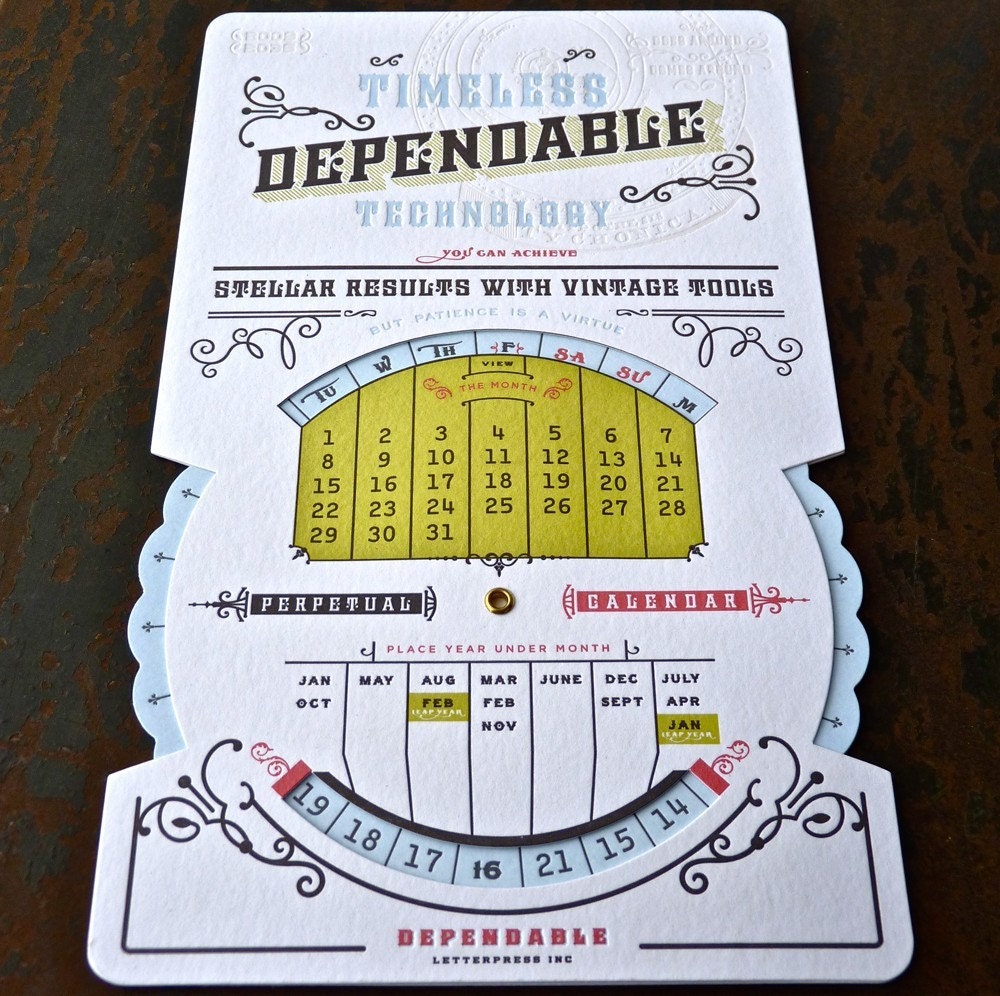Happy New Year! Right now I am kind of obsessed with this letterpress perpetual calendar I just purchased from San Fran's Dependable Letterpress. So slow tech! There's a beautiful roundup of vintage perpetual calendar designs on flickriver - maybe the brass or wood ones are more your style.
On Slow Design and Slow Home:
- Sustainable building, renovations and retrofits can be economic drivers that create jobs and bolster local economies, pointed out TreeHugger and The Atlantic.
- Treehugger's Lloyd Alter explained the connections between green building and resilient design and rounded up a bunch of resources on resilience.
- Ecosalon rounded up the best of their shelter stories in 2011, observed a New Antiquarian trend, and made some predictions for 2012. Slowness abounds. So do maps and typography.
- Inhabitat asked experts what's ahead for sustainable design, and along with the usual suspects the answers included social pairing (a collaborative consumption idea) and co-housing, and the emergence of make-it-yourself and repair and restoration as major market drivers.
- Meanwhile, here is the antithesis of Slow Home ideas: builders in North America are pushing ever bigger, more cheaply built houses. Facepalm.
- Sustainable business strategists BSR are working with the Danish Fashion Institute to explore how conscious consumerism can transform fashion with their Nice Consumer initiative.
- Customizable jewelry was one of the hot trends of the holidays.
- Ecouterre profiled Brookyn Sewn's full-service small-scale local fashion manufacturing model - so inspiring.
- EcoSalon's stories-of-the-year feature called out trashion as a gimmicky distraction to real progress and noted growing support for the buy local and slow fashion movements.
- Ecouterre's roundup of eco-fashion predictions for 2012 included an emphasis on artisanship, authenticity, quality, handcrafted, and local production. Sounds pretty slow to me! There are also shout-outs to customizability and 3-D printing, and recognition that the business realities for emerging designers are pretty grim.
On Slow Living:
The magnificent BrainPickings profiled advice to sink in slowly, a fab poster project from the UK (and yes, you can buy them). This one is 'Take Time' by Temujin Doran.
- Did you know it's been 200 years since the Luddite uprisings? Here's a thought-provoking piece in The Guardian about their legacy, and one of the websites for the bicentenary events has a quick history of the uprisings.
- The Times' Sunday Review tackled our desire to unplug, and the99percent suggested ways to create downtime and 'sacred space'.
- Internet retail giant Amazon has begun actively undermining independent local retailers by encouraging shoppers to spy for them so they can undersell their competition, Gawker report.
- Here's a primer on Slow Cities (Cittaslow) written with an Australian audience in mind.
- The Atlantic interviewed transition movement author extraordinaire Rob Hopkins.
- On the collaborative consumption front, the 'little free library' concept got press from The Atlantic Cities and GOOD - and A Bit Slow explained co-housing.
- FastCo had a fascinating post on the reasons the future of business is homegrown, small-scale, and independent. On a related note, the Globe & Mail asked futurist Jim Carroll what trends he sees, and they included relocalization and micro-manufacturing by hobbyists.
- SlowMama wrote about the challenges and rewards of nurturing friendships. (Oh boy, can I ever relate to the lady who asked the question.)
- Courtney from bemorewithless discussed the idea of using a love list instead of resolutions when you're goal-setting.
- Ecosalon introduced us to the Japanese concept of oosouji. I like it. (Of course, it might take me until this time next year to actually put it into practice. I'm in the middle of decluttering and despairing of ever finishing, short of piling it all in the backyard and setting it alight.)
The magnificent BrainPickings profiled advice to sink in slowly, a fab poster project from the UK (and yes, you can buy them). This one is 'Take Time' by Temujin Doran.
- Chow had a really interesting article on a possible schism within Slow Food USA over the $5 Challenge and further discussion here. My take: I think the $5 challenge is needed. The popular perception of Slow Food (or even local food) as uber-expensive needs to be changed. The idea that cooking is hard or time-consuming needs to be challenged. Showing that it's pretty easy to whip up a meal with local ingredients that takes as little time and costs the same per person as a fast food or pre-prepared meal, but is both tastier and more nutritious - that's a really worthwhile project. I think it's pretty easy for people who are passionate about food to forget that the average middle-class non-foodie isn't as aware of nutrition or food politics as they are. Lots of us have never really been taught how to cook. Most of us non-foodies (and yes, I count myself as a non-foodie) struggle to get enough veggies and fruit on the table and rely much too heavily on convenience foods, no matter how great our intentions are. We need the kind of inspiration that $5 challenge blog posts bring. I know some are concerned that the $5 challenge could create downward price pressure for local producers, but it's a single meal event. It's not about beating the fast food giants at their own game, it's about getting people to rethink their assumptions about food and cooking in an accessible way, and fostering conversation. As ecosalon point out, the ideas of Slow Food need to reach a much broader consumer audience in order to generate real changes in the industrialized food system, and that's going to take time and lots of little projects like the $5 challenge.
- The New York Times took a careful look at the increasing unsustainability of organic food that's bound to stimulate a lot of discussion.
- Treehugger had an interesting article on Dan Carmody's work in Detroit shows that designing smarter farmers' markets to act as third spaces can stimulate local food production and manufacturing. Oh, and here is a related quote from 1830 about the importance of fairs and market-towns to cottage industries on No Tech.
- Slow Food introduced for a Malaysian readership: http://www.nst.com.my/opinion/columnist/how-our-food-choices-affect-the-world-1.20534
- Scientific American weighed in on the impracticality of nonseasonal foods and profiled Slow Money.
- I love the idea of a slow food Preschoolers' Potluck.
- GOOD commented on the appropriation of the term 'artisanal', noted the trend toward microdistilled alcoholic beverages, and profiled an interesting local food startup that supports Alabama farmers.
- Design Observer published a thought-provoking piece on Big Food's misdeeds in the global South.
- Fabulous Edmonton-based food blogger A Canadian Foodie has a fantastic series of posts about food trends for 2012 that she and her international circle of bloggers, writers, and chefs are seeing emerging - you should start here and click through all seven parts. I found it really inspiring how passionate her respondents all are, and how slow food themes like localness, sustainability, heritage varieties, comfort foods, and culinary traditions were mentioned repeatedly, alongside concerns about affordability and accessibility.
- EcoSalon summed up their favourite destinations covered over the past year.
- One of the hot travel trends for 2012 will be personalized genealogical and re-enactment tours for travellers looking to explore their family history.
- The not-for-profit World Shibori Network run slow-cloth themed tours through offshoot program Slow Fiber Studios. Past tours have gone to Japan, India, France, Italy and this year they're planning trips to Japan, France, and Mexico. Hmm, I've always wanted to learn more about natural dye techniques...
- Science writer John Rennie wrote a brilliant piece for Smart Planet on the psychological factors that may - or may not - prevent humans from acting quickly on the evidence of anthropogenic climate change.
- The Atlantic summed up the year in climate change politics.
- The Natural Step Canada's executive director Chad Park made a thought-provoking argument that Corporate Social Responsibility is inadequate.
- YES! Magazine pointed out this fantastic TEDx talk by Michael Mann on the politicization of science, and OpenCulture contextualized Neil deGrasse Tyson's talk on the decline in scientific research done in the United States. (Here's some global context for you.) These are not unrelated topics, and they're worrying for more than political reasons: scientific innovation is a major economic driver. Oh, and Canada is in much the same position thanks to the short-sightedness of present and past governments.
- Conservative American politicians are attacking green building standards on multiple fronts: see the recent TreeHugger articles on Maine, the Department of Defense, the light-bulb debacle, and the "Agenda 21" conspiracy theory. Definitely read the one about the conspiracy theory, because it seems to be driving a lot of Tea Party anti-green rhetoric - then follow up with Lloyd Alter's new years' piece.


No comments:
Post a Comment